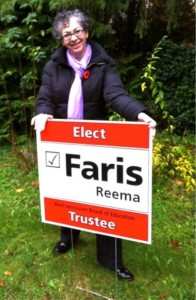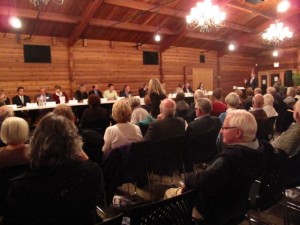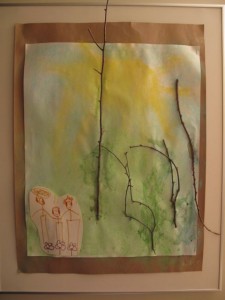Posts Tagged ‘School Board Trustee’
To The Graduating Class of 2013
My remarks to the Sentinel Secondary School graduating class of 2013. Another version of this presentation was delivered to the Rockridge graduating class on May 17, 2013. This is a full transcript of my words and as is typical with verbal presentations, adjustments and/or changes may have been made while speaking.
Thank you. Merci.
I’m so pleased to be here tonight. Je suis très heureuse d’être ici avec vous ce soir.
On behalf of the West Van Board of Education, my congratulations to all this year’s graduates. Félicitations!
I know many of you are wondering who is this talking head and why does she get to speak at my grad?
Well, in the November 2011 municipal elections I and four others were elected by West Van residents to serve as Trustees on the Board of Education.
That means my colleagues and I help to oversee the public education system in our community and that along with your teachers, the staff at the school and the district, parents and yourselves, we have a measure of responsibility and accountability for your education from kindergarten through to Grade 12.
I also happen to be a graduate of school district 45.
Even though I’ve been around the District on and off since I was twelve, and even though I’ve been to Sentinel a number of times, I wanted to get a better feel for the school and its students before I spoke tonight.
I phoned up Principal Mike Finch and asked if we could tour the school together. And we did. I got to see some of you at work and some of you at play. I had a look into many of the classrooms and then I asked Mr. Finch to tell me about you, to tell me about students at Sentinel.
I’m just gonna give you a moment to think about what he told me.
No, he didn’t say that. Oh, he’d never say that, would he? No way. Uhuh.
What he did tell me is how impressed he has been by the students at Sentinel. How dedicated you are and how motivated you are to succeed on your own terms whether you’re studying French, pursuing your athletic interests in the academies, or being super achievers.
Barb Sunday, one of your amazing art leaders told me during my visit to the school, that she’d sent off about 50 advanced placement art portfolios for consideration. 50! And if you stop by the Ferry Building Gallery at the foot of 14th Street, you’ll see some of that art on display.
What you’ll also see there is the commitment you’ve made to pursuing your passions and the care you’ve taken to excel in the work you do.
And tonight we’re here to celebrate your accomplishments.
For parents, it’s a bittersweet moment, likely tinged with a sense of relief! Tonight is a chance to celebrate the wonderful individuals you’ve become and yet we also have to be prepared to let you go.
That’s what parents do.
And like parents, the teachers, the administration, and all the staff of the West Van school district – even Trustees, we all have to do our best to make sure you grads have the skills and talents you need to continue to succeed. And now you’re moving on.
But it’s not easy as parents or teachers or administrators to let you go because we know that the journey can sometimes be a challenge.
I would like to share with you some words by the Lebanese poet Kahlil Gibran. In his poem on children, he writes:
Your children are not your children.
They are the sons and daughters of Life’s longing for itself.
They come through you but not from you,
And though they are with you yet they belong not to you.
You may give them your love but not your thoughts,
For they have their own thoughts.
You may house their bodies but not their souls,
For their souls dwell in the house of tomorrow, which you cannot visit, not even in your dreams.
As Gibran says, you, our graduates, you live in tomorrow and we are not here to stand in your way.
You’ve worked hard or maybe you haven’t. You’ve had good days and bad. You’ve made friends, you’ve lost friends. You’ve studied, you’ve learned. You’ve been on a journey and now you’re set for the next stage of life whatever that may be for you.
And what do you need to successfully navigate what’s ahead?
To borrow the words of Canadian musicians David Myles and Classified, you need to embrace your inner ninja.
Be fierce and determined and passionate. Dream big and take action.
Stand up for yourself. More importantly, stand up for others.
Stand up for what you believe. More importantly, be tolerant and allow others to speak up for what they believe.
Stand up for what is right. More importantly, be open to different views and adjust your ideas if warranted.
And finally, Sentinel grads, take all that we — the community, the school District, the administration, your teachers, and your parents — take all that we have given you, take all that you are, and make the world you are inheriting, make it better.
Make the world better for you, for me, and for those who have so much less than either of us.
I know you can do it. I know you can do it.
Thank you and bonne chance!
What Does It Mean?
Stepping into a profession, we can expect to be bombarded by acronyms and terms specific to that field. The BC public education system, for example, is rife with them: MoE, BCSTA, BCPSEA, BCSSA, BCASBO, BCTF, CUPE, BCCPAC, HR, F&F, AFG, AbEd, IB, PYP, MYP, IEP, FSAs, standardized testing, needs assessment, self-regulation, special needs, 21st century learning, etc.
Amongst the list of terms is one used to describe the model in which Boards of Education and the provincial government function: co-governance.
But what does co-governance mean?
I decided to look it up and started with the word governance. Here’s what I found:
governance:
- government; exercise of authority; control.
- a method or system of government or management.
And “co-”? It’s apparently a variation of “com-” which is defined as follows:
a prefix meaning “with,” together,” “in association,” and (with intensive force) “completely,” occurring in loan words from Latin (commit): used in the formation of compound words…
Putting the two together, I can say co-governance is a shared exercise of authority, control exerted in association with one another, or a partnership system of government or management.
Defining the term is easy, but applying it to BC’s public education system, as currently structured and operating, may be a misnomer.
Why?
Because the inherent nature of the relationship is one of imbalance. Public education is financed by public revenues which are allocated by the province.
And if one party in a relationship is the ultimate arbiter of funds, then it may be a challenge to ensure that other critical issues are addressed on the basis of a co-governance model. In the past few weeks alone, we’ve seen the release of a 10-year framework for bargaining as well as the debut of a new website, mostly with little or no direct consultation with Trustees.
I’ll admit it’s not easy when one has a firm grasp of the purse strings to share control, but the current structure is paternalistic and does not lend itself easily to a co-governance model.
And while my call for a Royal Commission on Education is likely to continue falling on deaf ears, here are two things I’d like to see.
First, I would like all eligible voters in BC to vote in the May 14 provincial election no matter what their political persuasion.
Second, I would like the new government, whether Liberal, NDP, Green, Conservative, or other to convene a meeting with Board of Education Trustees. Maybe two from each district. That’s a group of 120 people.
And talk.
Have a real discussion.
A substantive discussion.
One where Trustees do most of the speaking and elected officials and Ministry representatives do the listening.
And then do the same with each significant group in the education sector.
Compile the results of these discussions, distribute the report, and then put everyone in a room together to see if we can work together to ensure that our children will continue to benefit from a vibrant and thriving public education system.
One that is not characterized, if I may borrow from the philosopher Hannah Arendt, by questions of “what are we fighting against”, but “what are we fighting for?”.
And let’s see, if through dialogue, we can put the “co-” back into “co-governance”.
A Conversation Starter Or The End of A Conversation?
Ratified. That’s the word which characterizes this weekend for me. It denotes success and a goal accomplished. It indicates progress and sets a marker for the way forward.
The Agreement in Committee, a framework for bargaining which was fashioned in a collaborative effort between BCPSEA* and the BCTF**, was ratified this weekend at two separate meetings: the BCPSEA Annual General Meeting and the BCTF Representative Assembly.
This is a bold step for these two organizations. It sets the stage for positive dialogue before the start of labour negotiations. That doesn’t necessarily mean the discussions will be easier or decisions arrived at without difficulty; it does mean that the parties have opened a door to a respectful process, respectful interaction, and — I hope — results.
Yet this step forward may have been jeopardized given the startling turn of events on Thursday, January 24, 2013.
Why?
On Thursday, the provincial government released a document entitled “A Framework For Long Term Stability In Education” ) which came as a surprise to many of us who have a role to play in the public education system in British Columbia.
Although stakeholder submissions had been made by key partner groups on the issue of bargaining before the December holidays, this framework was much broader and incorporated many more issues than I believe were contemplated in those submissions.
While the goal of “stability” in education is admirable, and the narrative that has been designed to sell this new initiative may sound awfully good, scratch beneath the surface and many troubling issues emerge.
For example, why 10 years? Where is the business case for introducing a level of inflexibility which may take away from the employers’ ability to respond to changing circumstances and uncertain economic conditions? Given rapid changes in technology and the reassessment of education, which seems to be in progress in many parts of the world, proposing such a lengthy time span seems like building your foundation on shifting sands.
Premier Clark and Don McRae, the Minister of Education, have both spoken about the plan and the media, including the full array of social media, have played and replayed, digested and parsed their comments.
I also had the opportunity of hearing Minister McRae speak in-person at the BCPSEA AGM today.
He said, again, that this framework was just the beginning, but I see it as stalling momentum rather than encouraging it.
Rather than asking what the best way to fund the public education system may be, we are now debating the merits of establishing yet another separate fund to deal with specific aspects of program delivery and service provision.
Rather than asking what the best way to set educational policy may be, we are now debating who should sit at the table of the proposed educational council.
Rather than asking how to ensure the best working relationship between the parties who negotiate, we are now trying to guess why the government seems intent on stripping BCPSEA of its core mandate which is to bargain on behalf of the 60 school boards in the province.
This government-proposed framework, says Minister McRae, is a conversation starter.
I see it, unlike the now-ratified Agreement in Committee, as a conversation ender.
*British Columbia Public Schools Employers’ Association (http://www.bcpsea.bc.ca)
**British Columbia Teachers Federation (http://www.bctf.ca)
Year One Retrospective
A year ago, I was elected as a Trustee to the West Vancouver Board of Education and it’s been an honour to work on behalf of this community. I’ve lived most of my life here, I’m a graduate of the school district in which I now play a role, and I’m fortunate I’m able to raise my child here.
As a public education community, we’re very lucky in West Vancouver. We have a great administrative team, we have inspiring leadership from our Superintendent, we have incredible staff, we have a caring Board, and we have a cadre of educators who are diligent, dedicated, and determined to deliver the highest quality teaching and learning.
We’re also favoured in that our community highly values education and families here generally have the means to ensure the best for their children. And yet, even with all these advantages, I see any number of troubling issues which appear to characterize the public education system in British Columbia.
And so, when I’m asked about my experience as a Trustee, my inclination is to say that the system is more complex and complicated than I realized despite having been an active parent-volunteer for five years before choosing to run for office.
Why?
In part, I think, because there are many different interpretations of the generally agreed upon underlying principle which I see as “the best interest of the child”.
Is the core purpose of education the success of the individual child or is it the betterment of society? Do parents know what’s best for their child or do teachers? Is an educator an autonomous professional or an expert member of a team?
I’m sure any one of us could generate an endless list of questions on the big picture of education, but then there are the practicalities. How is the provincial government able to show that funding per pupil is at an all time high while school districts have to nip, tuck, or cut programs and services in order to balance budgets? Given that 80% of a school district’s budget is consumed by salaries and benefits, how can innovative projects be implemented when resources are so constrained? How can infrastructure be maintained and new capital projects be contemplated with no additional funding?
Despite the seemingly intractable challenges, there’s no doubt in my mind that we have to do everything we can to foster dialogue on this issue. That education needs to be made the highest priority in this province, that we have to find a way to work collaboratively to make our strong system better.
The reason is simple. Education is the path to a more just and more equitable world.
And while it may be difficult to hold on to this truth given the evidence of the harm humans continue to do to the earth and to each other, it is why I remain committed to doing the best I can, for public education, in the remaining two years of my term.
Out And About In West Vancouver – Part Two
I filed my nomination papers on October 12, 2011, and I’m not quite sure how this happened, but five weeks have passed since then. A blink of an eye, a heartbeat, a breath.
It has been an intense five weeks: not so much because of the new challenge of running an election campaign for the first time, but because of the way the demands on my time and attention as a Mom, a candidate, an employee, a graduate student, and a volunteer seemed to escalate at the same time.
As much as I’ve enjoyed the experience, I have to admit I’m looking forward to kicking back tomorrow night, after what’s sure to be a frenetic day, to watch the results roll in once the polls have closed.
And even though tomorrow’s election day, I’ve already begun to file away lessons learned for the future. One of the most significant is that while it’s intimidating to promote yourself as a candidate, in the face of the reluctance of individuals to engage and the malaise that seems to hang over the modern electoral process, the connections you make are invaluable and essential.
I’m not just talking about the encouragement offered by friends and family or the surprising shouts of support from acquaintances, sometimes strangers. My favourite example of the latter was a woman who said to me, “I was talking to my son in Singapore today and he said to vote for Reema Faris.” I didn’t know her, I don’t know her son, but I had been recommended as a candidate in a message sent out by a supporter to acquaintances and colleagues, one of whom was the man in Singapore!
Other connections, connections which may be transitory or incidental, take on additional significance during a campaign because they resonate with meaning. I wrote about one such connection last night: the story of my conversation with a teacher for the visually-impaired who I met during a meet and greet at the Park Royal Shopping Centre last weekend.
I had a number of conversations that day, all of them meaningful in their own way. And one that sticks with me was the interaction I had with a woman who shrugged apologetically in passing, saying that she didn’t have children in the school system.

With all the activity in the days since, my recollection of the details is already hazy, but I think she did pick up a copy of my brochure and we did talk briefly.
What was so significant about this interaction?
Well, I’ve heard that assertion before: “I don’t have children in the school system”. And while that would make the election of Trustees more directly relevant to a voter, the Board serves on behalf of the entire community. So while it’s critical that you get out to vote tomorrow, please take the time to encourage everyone you know who also votes to cast their ballots, not just for Mayor and Council, but for Trustees as well whether or not they have school-age children or grandchildren. The Board of Education is theirs and they have a right to exercise their discretion in choosing candidates who will serve on their behalf effectively, efficiently, diligently, and passionately.
As I hope to do in West Vancouver.


